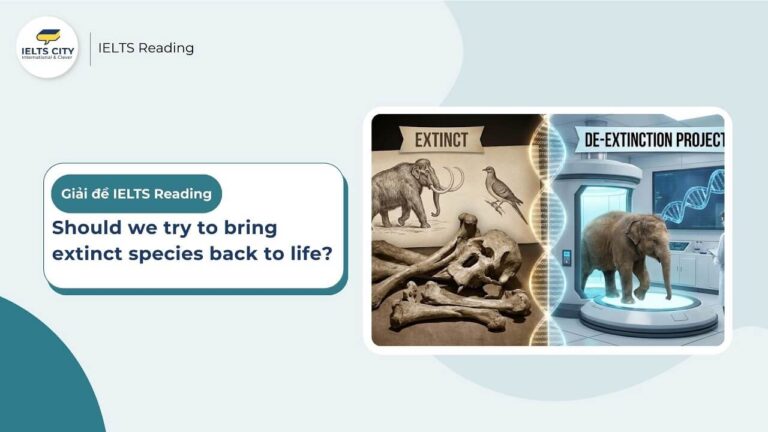
Nội dung chính
ToggleBài đọc
Willpower
A. Although willpower does not shape our decisions, it determines whether and how long we can follow through on them. It almost single-handedly determines life outcomes. Interestingly, research suggests the general population is indeed aware of how essential willpower is to their wellbeing; survey participants routinely identify a ‘lack of willpower’ as the major impediment to making beneficial life changes. There are, however, misunderstandings surrounding the nature of willpower and how we can acquire more of it. There is a widespread misperception, for example, that increased leisure time would lead to subsequent increases in willpower.
B. Although the concept of willpower is often explained through single-word terms, such as ‘resolve’ or ‘drive’, it refers in fact to a variety of behaviours and situations. There is a common perception that willpower entails resisting some kind of a ‘treat’, such as a sugary drink or a lazy morning in bed, in favour of decisions that we know are better for us, such as drinking water or going to the gym. Of course this is a familiar phenomenon for all. Yet willpower also involves elements such as overriding negative thought processes, biting your tongue in social situations, or persevering through a difficult activity. At the heart of any exercise of willpower, however, is the notion of ‘delayed gratification’, which involves resisting immediate satisfaction for a course that will yield greater or more permanent satisfaction in the long run.
C. Scientists are making general investigations into why some individuals are better able than others to delay gratification and thus employ their willpower, but the genetic or environmental origins of this ability remain a mystery for now. Some groups who are particularly vulnerable to reduced willpower capacity, such as those with addictive personalities, may claim a biological origin for their problems. What is clear is that levels of willpower typically remain consistent over time (studies tracking individuals from early childhood to their adult years demonstrate a remarkable consistency in willpower abilities). In the short term, however, our ability to draw on willpower can fluctuate dramatically due to factors such as fatigue, diet and stress. Indeed, research by Matthew Gailliot suggests that willpower, even in the absence of physical activity, both requires and drains blood glucose levels, suggesting that willpower operates more or less like a ‘muscle’, and, like a muscle, requires fuel for optimum functioning.
D. These observations lead to an important question: if the strength of our willpower at the age of thirty-five is somehow pegged to our ability at the age of four, are all efforts to improve our willpower certain to prove futile? According to newer research, this is not necessarily the case. Gregory M. Walton, for example, found that a single verbal cue – telling research participants how strenuous mental tasks could ‘energise’ them for further challenging activities – made a profound difference in terms of how much willpower participants could draw upon to complete the activity. Just as our willpower is easily drained by negative influences, it appears that willpower can also be boosted by other prompts, such as encouragement or optimistic self-talk.
E. Strengthening willpower thus relies on a two-pronged approach: reducing negative influences and improving positive ones. One of the most popular and effective methods simply involves avoiding willpower depletion triggers, and is based on the old adage, ‘out of sight, out of mind’. In one study, workers who kept a bowl of enticing candy on their desks were far more likely to indulge than those who placed it in a desk drawer. It also appears that finding sources of motivation from within us may be important. In another study, Mark Muraven found that those who felt compelled by an external authority to exert self-control experienced far greater rates of willpower depletion than those who identified their own reasons for taking a particular course of action. This idea that our mental convictions can influence willpower was borne out by Veronika Job. Her research indicates that those who think that willpower is a finite resource exhaust their supplies of this commodity long before those who do not hold this opinion.
F. Willpower is clearly fundamental to our ability to follow through on our decisions but, as psychologist Roy Baumeister has discovered, a lack of willpower may not be the sole impediment every time our good intentions fail to manifest themselves. A critical precursor, he suggests, is motivation – if we are only mildly invested in the change we are trying to make, our efforts are bound to fall short. This may be why so many of us abandon our New Year’s Resolutions – if these were actions we really wanted to take, rather than things we felt we ought to be doing, we would probably be doing them already. In addition, Muraven emphasises the value of monitoring progress towards a desired result, such as by using a fitness journal, or keeping a record of savings toward a new purchase. The importance of motivation and monitoring cannot be overstated. Indeed, it appears that, even when our willpower reserves are entirely depleted, motivation alone may be sufficient to keep us on the course we originally chose.
Kiến thức cần nắm:
Câu hỏi
Questions 27-33
Do the following statements agree with the information given in Reading Passage 3?
In boxes 27–32 on your answer sheet, write
TRUE if the statement agrees with the information
FALSE if the statement contradicts the information
NOT GIVEN if there is no information on this
27 Willpower is the most significant factor in determining success in life.
28 People with more free time typically have better willpower.
29 Willpower mostly applies to matters of diet and exercise.
30 The strongest indicator of willpower is the ability to choose long-term rather than short-term rewards.
31 Researchers have studied the genetic basis of willpower.
32 Levels of willpower usually stay the same throughout our lives.
33 Regular physical exercise improves our willpower ability.
Kiến thức cần nắm:
Questions 34 –39
Look at the following statements (Questions 37–40) and the list of researchers below.
Match each statement with the correct person, A–D.
Write the correct letter, A–D, in boxes 37–40 on your answer sheet.
NB You may use some letters more than once.
This researcher …
34 identified a key factor that is necessary for willpower to function.
35 suggested that willpower is affected by our beliefs.
36 examined how our body responds to the use of willpower.
37 discovered how important it is to make and track goals.
38 found that taking actions to please others decreases our willpower.
39 found that willpower can increase through simple positive thoughts.
List of People
A Matthew Gailliot
B Gregory M. Walton
C Mark Muraven
D Veronika Job
E Roy Baumeister
Kiến thức cần nắm:
Question 40
Which of the following is NOT mentioned as a factor in willpower?
Willpower is affected by:
A physical factors such as tiredness
B our fundamental ability to delay pleasure
C the levels of certain chemicals in our brains
D environmental cues such as the availability of a trigger
Kiến thức cần nắm:
Đáp án kèm phân tích
Questions 27–33: TRUE / FALSE / NOT GIVEN
27. Willpower is the most significant factor in determining success in life.
- Đáp án: TRUE
- Giải thích: Bài đọc khẳng định rằng ý chí “gần như một mình quyết định kết quả cuộc sống” (“almost single-handedly determines life outcomes”). Cụm từ “almost single-handedly” (gần như một mình) đồng nghĩa với “most significant” (quan trọng nhất).
- Vị trí và trích dẫn: Đoạn A.”It almost single-handedly determines life outcomes.”
28. People with more free time typically have better willpower.
- Đáp án: FALSE
- Giải thích: Bài đọc nói rằng ý kiến cho rằng có nhiều thời gian rảnh rỗi hơn sẽ dẫn đến tăng ý chí là một “nhận thức sai lầm phổ biến” (“widespread misperception”). Điều này trực tiếp mâu thuẫn với câu nhận định.
- Vị trí và trích dẫn: Đoạn A.”There is a widespread misperception, for example, that increased leisure time would lead to subsequent increases in willpower.”
29. Willpower mostly applies to matters of diet and exercise.
- Đáp án: FALSE
- Giải thích: Bài đọc có đề cập đến việc ăn kiêng (resisting a ‘treat’) và tập thể dục (going to the gym) như một ví dụ quen thuộc. Tuy nhiên, nó ngay lập tức nói thêm rằng ý chí “cũng bao gồm” (“also involves”) nhiều yếu tố khác như kiểm soát suy nghĩ tiêu cực hay kiên trì. Do đó, việc nói nó “chủ yếu” (mostly) áp dụng cho ăn kiêng và tập thể dục là sai.
- Vị trí và trích dẫn: Đoạn B.”Yet willpower also involves elements such as overriding negative thought processes, biting your tongue in social situations, or persevering through a difficult activity.”
30. The strongest indicator of willpower is the ability to choose long-term rather than short-term rewards.
- Đáp án: TRUE
- Giải thích: Bài đọc nói rằng khái niệm “trì hoãn sự thỏa mãn” (delayed gratification), tức là chống lại sự hài lòng tức thì để nhận được sự hài lòng lớn hơn trong dài hạn, nằm “ở trung tâm của bất kỳ sự thực thi ý chí nào” (“At the heart of any exercise of willpower”). “Ở trung tâm” (at the heart of) đồng nghĩa với “chỉ báo mạnh mẽ nhất” (strongest indicator).
- Vị trí và trích dẫn: Đoạn B.”At the heart of any exercise of willpower, however, is the notion of ‘delayed gratification’…”
31. Researchers have studied the genetic basis of willpower.
- Đáp án: TRUE
- Giải thích: Bài đọc nói rằng các nhà khoa học đang “thực hiện các cuộc điều tra chung” (“making general investigations”) về lý do tại sao một số cá nhân có khả năng trì hoãn sự thỏa mãn tốt hơn người khác, nhưng nguồn gốc di truyền vẫn còn là một bí ẩn. “Making investigations” chính là “studying”. Câu hỏi chỉ hỏi liệu họ có nghiên cứu hay không, chứ không hỏi kết quả.
- Vị trí và trích dẫn: Đoạn C.”Scientists are making general investigations into why some individuals are better able than others to delay gratification and thus employ their willpower, but the genetic or environmental origins of this ability remain a mystery for now.”
32. Levels of willpower usually stay the same throughout our lives.
- Đáp án: TRUE
- Giải thích: Đoạn C nói rõ rằng mức độ ý chí “thường duy trì ổn định theo thời gian” (“typically remain consistent over time”) và các nghiên cứu theo dõi từ thời thơ ấu đến khi trưởng thành cho thấy một sự nhất quán đáng kể.
- Vị trí và trích dẫn: Đoạn C.”…levels of willpower typically remain consistent over time (studies tracking individuals from early childhood to their adult years demonstrate a remarkable consistency in willpower abilities).”
33. Regular physical exercise improves our willpower ability.
- Đáp án: NOT GIVEN
- Giải thích: Bài đọc có sử dụng phép ẩn dụ rằng ý chí hoạt động “giống như một cơ bắp” (“like a muscle”) và tiêu thụ năng lượng. Tuy nhiên, nó không hề đề cập đến việc liệu tập thể dục thể chất có thực sự cải thiện khả năng ý chí hay không.
Đăng ký nhận tư vấn miễn phí
Ưu đãi học phí lên đến 50%
& Cơ hội nhận học bổng trị giá 4.000.000 VNĐ
Đăng ký nhận tư vấn miễn phí
Ưu đãi học phí lên đến 50%
________
Questions 34–39: Matching Feature
34. identified a key factor that is necessary for willpower to function.
- Đáp án: E. Roy Baumeister
- Giải thích: Đoạn F nói rằng Roy Baumeister cho rằng một “tiền đề quan trọng” (critical precursor) là “động lực” (motivation). Nếu không có động lực, nỗ lực sẽ thất bại. Đây chính là một yếu tố cần thiết để ý chí hoạt động.
35. suggested that willpower is affected by our beliefs.
- Đáp án: D. Veronika Job
- Giải thích: Đoạn E nêu rõ nghiên cứu của Veronika Job chỉ ra rằng “những người nghĩ rằng ý chí là một nguồn tài nguyên hữu hạn” (those who think that willpower is a finite resource) sẽ cạn kiệt nó nhanh hơn. Đây chính là ảnh hưởng của niềm tin (beliefs).
36. examined how our body responds to the use of willpower.
- Đáp án: A. Matthew Gailliot
- Giải thích: Đoạn C mô tả nghiên cứu của Matthew Gailliot cho thấy ý chí “vừa cần vừa làm cạn kiệt lượng đường trong máu” (both requires and drains blood glucose levels). Đây là một phản ứng của cơ thể (body).
37. discovered how important it is to make and track goals.
- Đáp án: C. Mark Muraven
- Giải thích: Đoạn F nói rằng Muraven nhấn mạnh giá trị của việc “theo dõi tiến độ hướng tới một kết quả mong muốn” (monitoring progress towards a desired result), ví dụ như dùng nhật ký tập luyện. Đây chính là việc theo dõi mục tiêu.
38. found that taking actions to please others decreases our willpower.
- Đáp án: C. Mark Muraven
- Giải thích: Đoạn E mô tả nghiên cứu của Mark Muraven cho thấy những người “cảm thấy bị ép buộc bởi một cơ quan bên ngoài” (felt compelled by an external authority) sẽ bị cạn kiệt ý chí nhiều hơn. “Bị ép buộc bởi cơ quan bên ngoài” tương đương với “hành động để làm hài lòng người khác”.
39. found that willpower can increase through simple positive thoughts.
- Đáp án: B. Gregory M. Walton
- Giải thích: Đoạn D nói rằng Gregory M. Walton nhận thấy một “gợi ý bằng lời nói đơn giản” (a single verbal cue) – nói rằng nhiệm vụ có thể “tiếp thêm năng lượng” cho họ – đã tạo ra sự khác biệt lớn về mức độ ý chí. Đây là một ví dụ về suy nghĩ tích cực đơn giản.
Question 40: Multiple Choice
40. Which of the following is NOT mentioned as a factor in willpower?
- Đáp án: C. the levels of certain chemicals in our brains
- Giải thích:
- A (physical factors such as tiredness): Được đề cập trong Đoạn C (“…fluctuate dramatically due to factors such as fatigue…”).
- B (our fundamental ability to delay pleasure): Được đề cập trong Đoạn B là khái niệm cốt lõi “delayed gratification”.
- D (environmental cues such as the availability of a trigger): Được đề cập trong Đoạn E với ví dụ về việc để bát kẹo trên bàn làm việc (“out of sight, out of mind”).
- C (the levels of certain chemicals in our brains): Bài đọc có đề cập đến “lượng đường trong máu” (blood glucose), nhưng không hề đề cập đến các chất hóa học cụ thể trong não (in our brains) như serotonin hay dopamine. Đây là yếu tố không được nhắc đến.
Cập nhật đề thi thật mới nhất tại:





















